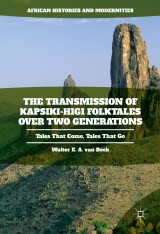Details

The Transmission of Kapsiki-Higi Folktales over Two Generations
Tales That Come, Tales That GoAfrican Histories and Modernities
|
53,49 € |
|
| Verlag: | Palgrave Macmillan |
| Format: | |
| Veröffentl.: | 03.11.2016 |
| ISBN/EAN: | 9781137594853 |
| Sprache: | englisch |
Dieses eBook enthält ein Wasserzeichen.
Beschreibungen
<p> </p><p>This study on Kapsiki-Higi tales compares two corpuses of stories collected over two generations. In this oral setting, folktales appear much more dynamic than usually assumed, depending on genre, performance and the memory characteristics of the tales themselves. In northeastern Nigeria the author collected these tales twice with a time gap of two generations, in order to assess the dynamics of this oral transmission. The comparison between the two corpuses shows that folktales are a much more dynamic cultural system than is usually thought. These dynamics affect some types of tales more than others, reflect social change and intergroup contact, but also depend on characteristics of the tales themselves. Cognitive approaches of memory shed light on these varieties of transmission, as do performance aspects in tale telling, in particular ideophones.</p>
<p>1. Tales at two times.-.2. Grouping the tales.-.3. The tales, old and new.-.4. Tales that went, tales that came.-.5. Remembering folktales.</p>
<p>Walter E.A. van Beek is Emeritus Professor of Anthropology of Religion at Tilburg University and Leiden University, the Netherlands, and has performed extensive fieldwork among the Kapsiki-Higi. His recent publications are <i>The Dancing Dead. Ritual and Religion among the Kapsiki/Higi</i> (2012) and <i>The Forge and the Funeral; the Smith in Kapsiki/Higi Culture</i> (2015). </p>
<p> </p><p>This study on Kapsiki-Higi tales compares two corpuses of stories collected over two generations. In this oral setting, folktales appear much more dynamic than usually assumed, depending on genre, performance and the memory characteristics of the tales themselves. In northeastern Nigeria the author collected these tales twice with a time gap of two generations, in order to assess the dynamics of this oral transmission. The comparison between the two corpuses shows that folktales are a much more dynamic cultural system than is usually thought. These dynamics affect some types of tales more than others, reflect social change and intergroup contact, but also depend on characteristics of the tales themselves. Cognitive approaches of memory shed light on these varieties of transmission, as do performance aspects in tale telling, in particular ideophones.</p>
Explores the folktales of the Kapsiki-Higi people in a comparative analysis across generations and among various African cultures Provides answers to important questions of memory and cultural studies of African peoples Uses historical, anthropological, and literary analysis in a unique approach and examination of transnational African culture
Diese Produkte könnten Sie auch interessieren:

The Last Samurai - Japanische Geschichtsdarstellung im populären Kinofilm

von: Daniel Scherrer

34,99 €















